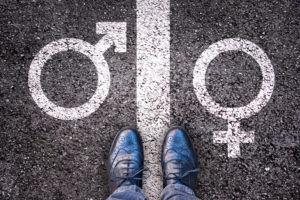It can be challenging to define sexuality. Sure, for some, their sexuality emerges, and it feels totally natural and inconspicuous. Or they have the resources to easily work through any questions. But for others, it’s a challenge to decipher and come to terms with a unique sexual identity.
This guide is for everyone who want to discover the characteristics of some of the many sexualities — those seeking a welcome resource, those struggling through self-reflection, those wanting to better understand a stranger or a loved one.
Whatever your circumstance for seeking out this page, we can all benefit from an awareness of many sexualities. It helps foster empathy and equips us to face our own questioning feelings should the time ever come.
What Is Sexuality?

Defining your sexuality on a personal level may seem challenging, but luckily, there are clear sexuality definitions to work with. These are a self-identified label to describe your sexual attraction and romantic desires. It is helpful in terms of self-awareness and quickly communicates your preference to others. There are even different sexuality flags you can rep to show pride or solidarity.
Sexualities as sexual orientation are mainly broken down across:
- Sex itself (yes, sometimes, or no)
- Which genders you want to have sex with (none, one, or more)
- Aesthetic preference rather than a gendered one
If you’re a stickler for “proper” language, you may struggle with terminology that’s only common within the LGBTQIA+ community. It can move at a rather fast pace and often resists standardization. One person or group’s interpretation may vary from another; some people might strictly police terms with stipulations and exclusions.
Generally, the kindest course of action is to be accepting and flexible whenever possible, as sexuality can be a highly fraught facet of our identity.
The word “sexuality” itself can have a wide range of definitions. Even formal dictionaries define it differently, underlining how variable the language of it is.
- Merriam-Webster defines sexuality as “the condition of having sex; sexual activity; [or the] expression of sexual receptivity or interest […].” But some sexualities are based in a lack of sexual interest — and you can certainly have a specific sexuality without necessarily having sex.
- Google’s second definition through Oxford Languages feels more useful: “a person’s sexual orientation or preference.” It is solid on the simplest level but lacks nuance.
- Cambridge Dictionary tells us it’s “someone’s ability to experience or express sexual feelings; attitudes and activities relating to sex.” This definition feels more rounded out, but actually, the wording is vague enough to be misinterpreted.
- Finally, Wikipedia’s entry on human sexuality begins with the very succinct, sociologically-backed statement: “Human sexuality is the way people experience and express themselves sexually.” The page continues, “This involves biological, erotic, physical, emotional, social, or spiritual feelings and behaviors. Because it is a broad term, which has varied with historical contexts over time, it lacks a precise definition.”
What Is Romantic Attraction?
Another aspect of many sexualities is its romantic equivalent. Romantic attraction is an emotional response to someone, a spark of connection deeper than wanting a friendship and independent of any desire for sex.
When you want to keep someone emotionally close, enjoy their special attention, and perhaps long for non-sexual intimacy like cuddling or gentle touches, you might be romantically attracted.
Many people feel this in tandem with sexual attraction, but it can linger (or develop!) even in the face of sexual incompatibility, and you may not be romantically interested in someone great in bed. This can be a confusing part of sexuality to explore. It can sneak up on you slowly, and your romantic interests may be more varied than your sexual ones.
For most of the following sexualities, you can replace -sexual with -romantic to express that preference in its emotional, non-sexual terms.
A Curated List of Sexual Orientations
Questioning
This is for those of us who are unsure or exploring. Perhaps you always believed you only like men, but suddenly a woman has your total interest. Perhaps you’re grappling with past experiences that don’t mesh with your current identity, and wondering what that makes you exactly? Questioning is a great transitional stage. It means you’re being receptive and reflective with yourself! It is also an entirely valid place to be on the sexuality spectrum.
Bicurious
In the same vein as questioning, this usually describes a person who is experimenting outside of their usual gender preference. It expresses curiosity but also has an air of action. To satisfy that curiosity and reach a conclusion, you can embark on some bicurious adventures in sex or romance.
Queer
Queer is a reclaimed umbrella term (it’s the Q in LGBTQ, along with questioning!). Whereas queer used to be mainly derogatory, today it’s a self-identification that you’re part of the LGBTQIA+ community. As a verb, you can also “queer” ideas like gender or relationships.
The word in any form lets you avoid more specific labels and leaves the door open to describing your own identity in rich, personal detail.
Fluid
Sexuality need not be completely fixed throughout a lifetime. The questioning person above, who can’t seem to reconcile their past with their present? They may come to describe their sexuality as fluid, acknowledging that our feelings can be diverse and unexpected, and that’s just fine!
Ultimately, a fluid person will probably ride the waves of attraction wherever that takes them, without stressing over the details too much. To take the concept a bit further, a genderfluid person will similarly just present themselves or identify however they’d like to at the time.
If that all sounds a bit freeform for your tastes, it’s also OK just to realize your sexuality (or gender, if that’s what you took away from this) has shifted. Try to accept it and shift with it. Congratulations! There’s a whole new world out there for you.
Allosexual Orientations and Preferences
Being allosexual, by definition, means you experience sexual attraction toward other people. It is the flipside of asexual, which we’ll get into below.
Not to be confused with autosexual, meaning someone who experiences sexual attraction toward themselves and prefers masturbation over sex with other people. This is a contested and misunderstood label, but if it helps express your sexual identity, by all means, claim it as your own.
Straight (Heterosexual)
People exclusively attracted to the “opposite” gender, a gender different than their own. The “het” or “hetero” portion may be used rather than straight, especially as in “cishet” (cisgender and heterosexual, a person whose gender identity matches their sex at birth and who is attracted to the gender opposite their own).
Gay
Men attracted exclusively to the same gender, other men.
Lesbian
Women attracted exclusively to the same gender, other women.
Bisexual
People attracted to their own gender and attracted to other genders.
Pansexual
People who may be attracted to any other person, regardless of gender — although even a pansexual person may have soft preferences.
Androsexual and Gynesexual
Respectively, these mean:
- Attracted to masculine individuals — or simply men, depending on the particular usage.
- Attracted to feminine individuals — or simply women, depending on the particular usage.
- For example, a genderqueer individual wouldn’t identify as a woman, so the label of lesbian (“same” gender) won’t describe their relationship to sexuality accurately.
- On the other hand, a lesbian might want to convey she’s overwhelmingly attracted to femme women — or a bisexual person can express their attraction to men and women who are masculine. This term is a real conversation starter and requires a little follow up.
Asexual Orientations and Preferences
These types of many sexualities have a lesser sexual attraction component, often with no sexual attraction at all. An asexual person can still have a sex drive or enjoy the physical sensation of sex, but it won’t be dependent on another person (barring instances of demi or gray sexuality — see below).
Aroace is a popular term meaning aromantic and asexual. An aroace person experiences no romantic or sexual attraction and has no innate desire pulling them toward a coupled relationship — at least in the traditional sense. Aroace people can still fully enjoy the familial and platonic closeness and intimacy!
Demisexual
In combination with a romantic preference, this person only (or most frequently) feels sexual attraction conditionally. Usually, it is contingent on a romantic/emotional relationship.
Graysexual/Gray Asexual
Within the sexuality spectrum, there is also an asexuality spectrum! Graysexual is for people who experience sexual attraction but very infrequently, and don’t identify as totally asexual. Claiming an allosexual label can be an uncomfortable fit, especially if their experiences don’t reflect typical sexual desire. If you’ve felt mostly asexual but had one or a few surprise attractions along the way, you may feel best represented by graysexual.
Sex-Repulsed/Sex-Averse Asexual
An asexual person with distinct disinterest in sexual activities, sometimes including feelings of disgust around the subject or act.
Sex-Indifferent Asexual
An asexual person who is neutral toward sexual activities, with no interest or disinterest in particular. Sex is not a given, but this person may be open to it for their partner.
Sex-Favorable Asexual
An asexual person who has a positive relationship with sexual activities. This person can enjoy sex on a physical or emotional level, and some sex-favorable asexuals may even seek it out to scratch that itch. There are just no feelings of sexual attraction toward others being triggered.
Takeaway
Hopefully, this starter’s list of many sexualities has provided some answers for you. But more importantly, we hope it’s inspired a few more questions!
Because there’s no definitive sexuality test to take, and it wouldn’t work anyway if you weren’t being honest. Equipped with new knowledge and continuing the curiosity you’ve shown here, you’re the one who can best explore your own sexuality.
Likewise, though, let other people determine theirs. You shouldn’t try to do it for them or push them. It’s a personal journey, and the best thing you can do is let them feel safe, supported, and heard. But occasionally, that might mean pointing them toward a helpful resource like this one.
Wherever you or your loved one is on that journey, we hope you find acceptance and happiness and make your sex life better.







